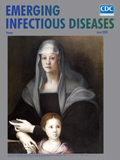
Volume 26, Number 6—June 2020
Dispatch
Melioidosis in a Resident of Texas with No Recent Travel History, United States
On This Page
Tables
Downloads
Article Metrics
Caitlin M. Cossaboom , Atanaska Marinova-Petkova, Jonathan Strysko, Gretchen Rodriguez, Trevor Maness, Jaime Ocampo, Jay E. Gee, Mindy G. Elrod, Christopher A. Gulvik, Lindy Liu, William A. Bower, Alex R. Hoffmaster, David D. Blaney, Johanna S. Salzer, Jonathan S. Yoder, Mia C. Mattioli, Thomas J. Sidwa, Lillian Ringsdorf, Gale Morrow, Elvia Ledezma, and Amanda Kieffer
, Atanaska Marinova-Petkova, Jonathan Strysko, Gretchen Rodriguez, Trevor Maness, Jaime Ocampo, Jay E. Gee, Mindy G. Elrod, Christopher A. Gulvik, Lindy Liu, William A. Bower, Alex R. Hoffmaster, David D. Blaney, Johanna S. Salzer, Jonathan S. Yoder, Mia C. Mattioli, Thomas J. Sidwa, Lillian Ringsdorf, Gale Morrow, Elvia Ledezma, and Amanda Kieffer
Abstract
To our knowledge, environmental isolation of Burkholderia pseudomallei, the causative agent of melioidosis, from the continental United States has not been reported. We report a case of melioidosis in a Texas resident. Genomic analysis indicated that the isolate groups with B. pseudomallei isolates from patients in the same region, suggesting possible endemicity to this region.
Burkholderia pseudomallei, which causes melioidosis, is a gram-negative saprophytic bacterium endemic to tropical and subtropical environments worldwide; to our knowledge, isolation from the continental United States has not been reported (1–3). The most overrepresented risk factor for melioidosis is diabetes mellitus (3,4). B. pseudomallei is resistant to many antimicrobial drugs (3). Laboratory exposures might occur without appropriate biosafety precautions (2,5).
Surveillance is challenging because melioidosis is not nationally notifiable; however, B. pseudomallei is a Tier 1 overlap Select Agent (6), and the Centers for Disease Control and Prevention (CDC) receives voluntary reports (2,7). We report a case of melioidosis in a Texas resident who had no recent travel history.





















.png)












No hay comentarios:
Publicar un comentario